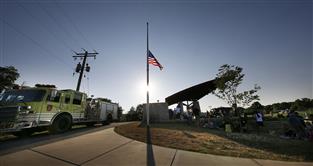Tosa Eagle Scout project aims to help monarch butterflies
Trail gets improvement with milkweed plantings

Working on his Eagle Scout project, Curt Homan (2nd right) digs another hole as First Class Scout member Jack Wanner (r) places the seed/sand mixture as volunteers plant hundreds of butterfly-friendly milkweed plants to help restore part of the Milwaukee County Grounds area off Watertown Plank Road Nov. 24. Photo By John O'Hara for CNI
A local Tosan helped butterflies in order to become an eagle. Curt Homan, with the help of 20 volunteers, planted milkweed seeds along the Monarch Trail as part of his Eagle Scout project.
Curt, whose brother helped the Monarch Trail in an earlier Eagle Scout project, enlisted the help to plant the seeds by hand.
The group planted a quarter-acre area of seeds, digging up the ground, putting the seeds in and re-covering it.
To start the project, Curt approached Barb Agnew, chairwoman of the Friends of the Monarch Trail, and said, "What is the most I can do to help the trail out?"
Agnew knew that the monarchs needed the most help. She told him the best thing to do for the trail would be to plant the milkweed, which is the monarch's host plant.
"I think Curt's been great at appreciating nature and butterflies," said Agnew. "It's not something every guy wants to get involved with, and it's essential."
Lots of paperwork
Curt had his work cut out for him. He had mountains of paperwork to do before the digging could begin. He had to get the plan approved by the Milwaukee County Parks Department along with his scoutmaster and scout committee.
The county natural areas coordinator, Brian Russart, loved Curt's project, even to the point of giving him a gallon of milkweed seeds free of charge.
Once the paperwork was complete, Curt spent hours pulling seeds from milkweed pods and putting them in bags of soil to get them ready.
The aspiring Eagle Scout recruited his friends, family and scouts to help him dig up the ground. With a need for shovels, he went door-to-door asking neighbors and friends for the tools.
The 17-year-old mowed the area before applying the seeds and set up a table, flags and got breakfast ready for the digging. The moment was about to come. Over 15 hours had been put into preparation.
Curt assigned the teams, the shovels and the area, and the sowing begun. Less than 30 minutes later the seeds were in and the deed was done.
"It went a lot faster than I thought it was going to," Curt said. "We were really organized."
Plight of the butterflies
Since the Milwaukee Metropolitan Sewerage District's implementation of basins in the Milwaukee County park, over 150 acres of milkweed-supporting ground have been lost. Milkweed is the only plant that the monarch caterpillars eat.
The county has since allowed for planting over the areas lost, but Agnew said the area was compacted by machinery and unable to support the plant.
"It was seeded and seeded again in 2010. Although it's coming, it's been painfully slow. This year the drought really slowed it down. When you look out over the hills and the landscape, there aren't the support plants needed that used to be there," Agnew said.
Curt's timing couldn't be better, Agnew said. The planting of the seeds in the winter will allow their cases to be broken by the cold, yet the plant will not start germinating until spring.
Although the planting will provide a base of operations for the milkweed, Agnew said the best thing for the butterfly-supporting plant would be a prescribed burn. She and the Friends of the Monarch Trail are working with the city to get a permit to burn small areas of the park.
More from News and Features
- Anodyne Coffee plans to open location in Wauwatosa Village
- Wauwatosa Meetings: Aug. 4
- Video: Wauwatosa girl's curbside ice cream stand raises money for the hungry
- Wauwatosa News and Notes: Hands-only CPR training offered; Firefly Art Fair is Aug. 6-7
- Wauwatosa Ask Now: Why are there barriers and fencing along the North Avenue bridges over the Menomonee River?
- Mystery Photo Contest: July 28
- Wauwatosa gears up for National Night Out event, this year at the zoo
- Election 2016: Wisconsin's 4th District candidates weigh in
- Wauwatosa's Luther Manor residents share smiles through flower delivery
- Wauwatosa Police Report: July 17-23














